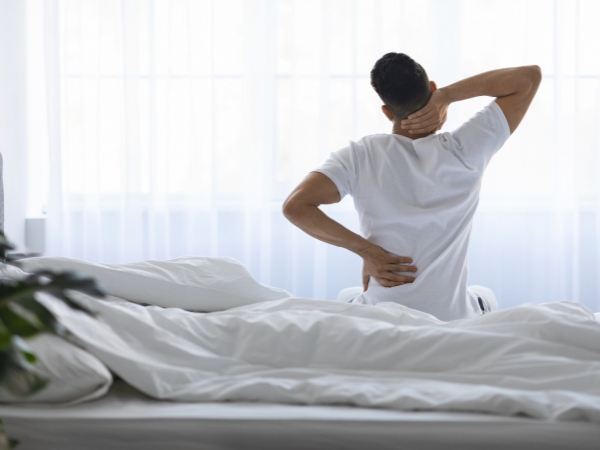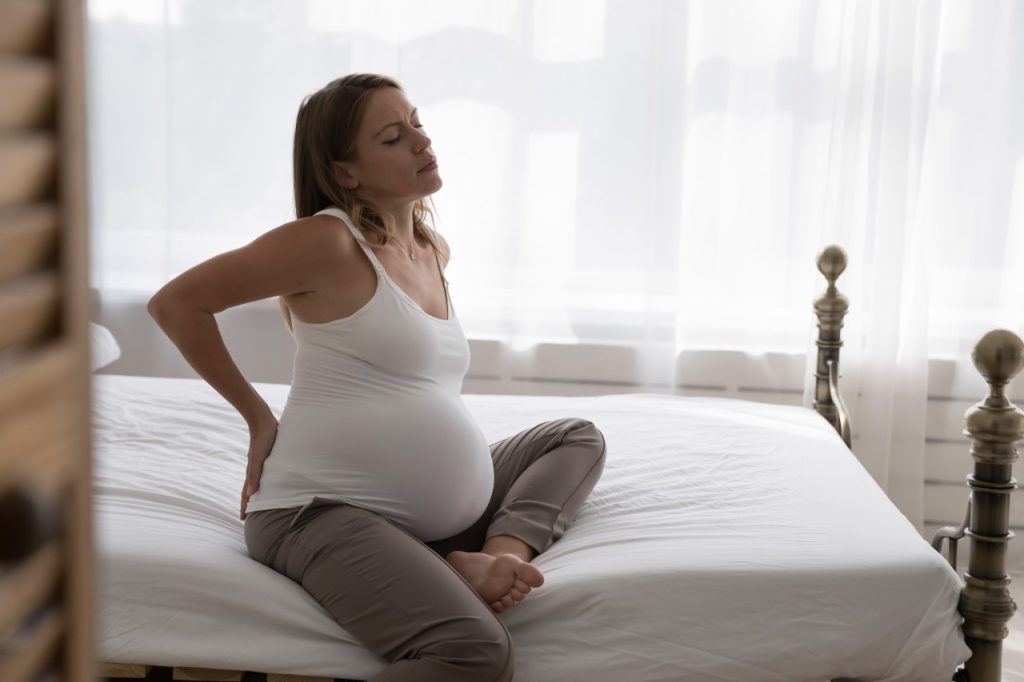Please search
Federica Molly
Expert
How to sleep with back pain: the ideal positions for a good rest

All useful tips to sleep well even with back pain
Back pain, or low back pain, is a problem that afflicts many people and can be particularly annoying during rest. In some cases this problem can be caused by pathologies or diseases, but often back pain is caused simply by stress, wrong postures or an unhealthy lifestyle. Even the positions taken during rest can have negative effects on back pain: sleeping in incorrect positions you risk overloading the lumbar area, causing or aggravating pain and resulting in feelings of discomfort and exhaustion. For this reason it is important to always pay attention to posture during night rest.
If you suffer from low back pain and are wondering how to sleep with back pain, here are some helpful tips and tricks that will help you relieve pain and improve the quality of your rest.
In which positions is it better to sleep with back pain?
As we have seen, back pain can make sleep disturbed and therefore adversely affect psychophysical well-being. In general, during rest it is important to try to maintain the natural curvature of the spine and make sure that the back has the right support and that the shoulders, head and hips are well aligned. It is therefore essential to carefully choose the bed system and a quality mattress, neither too rigid nor too soft, that adequately supports the body and ensures a healthy and comfortable rest.

The pain caused by low back pain can vary depending on the cases and specific conditions of each, but there are some positions that can help relieve back pain and provide relief:
- on one side with a pillow between the legs: it is one of the most suitable positions for those suffering from low back pain. Lying on one side by placing a pillow between the knees, in fact, helps to relieve the pressure on the spine and facilitate proper alignment, preventing or relieving back pain. However, avoid always sleeping on the same side because, in the long run, it could cause muscle problems or promote scoliosis;
- in the fetal position, particularly suitable for those suffering from herniated discs because they are positioned on the side with the knees raised to the height of the chest, bending the torso towards the knees, reduces bending of the spine and helps to open the space between the vertebrae;
- lying on your back with a pillow under your knees: even sleeping on your back with the addition of a pillow can be an ideal position to relieve back pain because it helps to evenly distribute weight and minimize pressure points. The pillow in this case is important to maintain the natural curvature of the lumbar area and provide additional support;
- on your stomach with a pillow under your stomach: sleeping on your stomach is not the most suitable position for rest, especially for those suffering from back pain, because it tends to stress the neck and back in an excessive way. Using a pillow placed under the pelvis and lower abdomen, however, can help relieve back pressure and improve column alignment.
Other tips to relieve back pain in bed
Choosing the right position while resting is crucial to prevent and counteract back pain, but there are also other small steps you can follow to try to alleviate or solve this problem. Regardless of your chosen position, try to keep your spine, shoulders, and hips in line at all times and fill in any gaps that might form between your body and bed using pillows so you don’t strain your muscles and spine too much. When you change position, do not make sudden movements or excessive twists to avoid losing alignment and always move your body all together, bringing your knees to your chest while you turn.
To prevent or alleviate lower back pain it is also important to pay attention to daily habits: regular physical activity and specific postural exercises and stretching of the spine will help you move correctly and maintain the right position even during rest.
Finally, consider changing your mattress. Keep in mind that generally mattresses have a duration of about ten years: after this period of time they may not provide adequate support and therefore promote or worsen back pain. A good mattress should be comfortable, breathable and have the right degree of rigidity to provide adequate support. Avoid too soft mattresses, which would tend to sink the body and alter the natural alignment of the spine.

How to sleep in pregnancy with back pain
Back pain is a very common problem, which can often appear or worsen during pregnancy. In expectant women, pain is usually localized in the lumbar area, but in some cases it can also extend to the legs, shoulder blades and pelvis, and can intensify from the fifth or sixth month of pregnancy, often also due to weight gain.
Back pain in pregnancy can have a negative impact on the daily routine, making some movements particularly tiring and painful, and adversely affect the quality of sleep. To avoid overloading the back and try to prevent back pain, it is important to follow some precautions, such as avoiding lifting heavy objects, always sitting with your back straight, keep weight gain under control, not to aggravate the pressure on the abdominal area, and regularly exercise.
To sleep in pregnancy with back pain you can follow some simple tips that will allow you to relieve pain:
- avoid sleeping on your back, as this position may cause excessive pressure on your spine and worsen your low back pain. Lie rather on your side, keeping your legs bent and facing your chest. To be more comfortable you can place a pillow between the knees, which also provides adequate support to the abdomen and back;
- choose a pillow not too high, which ensures maximum comfort and supports head and neck correctly. You can also choose to place an extra pillow under your belly or use a pregnancy pillow to better support your body, or purchase a memory topper to increase comfort and relieve hip aches.
Do you suffer from back pain and need further advice to choose the most suitable mattress? Contact us or visit us at one of Mollyflex stores. Our staff is always available to recommend the best products and more in line with your needs of rest.